七下Unit 3导学案
七年级英语下册第三单元教案(新人教版)

七年级英语下册第三单元教案(新人教版)教学目标1.学习掌握与购物相关的词汇与表达方式。
2.学会询问价格和询问并给予建议。
3.能够运用所学知识进行口语练习和书写练习。
教学重点1.学习购物相关的词汇。
2.学会用英语询问价格和给予建议。
教学难点1.如何运用所学知识进行口语练习。
2.如何在实际情境中进行购物对话。
教学准备1.教材:新人教版七年级英语下册。
2.多媒体设备。
教学过程导入(5分钟)1.利用多媒体展示一些不同商品的图片,通过简单提问引导学生进入课堂主题。
2.引导学生讨论以下问题:What can you buy in a store? How do you ask the price? How do you bargain?学习新知(20分钟)1.呈现与购物有关的词汇,并利用多媒体进行配图,帮助学生理解词汇的意义。
词汇包括:price, discount, cashier, customer, etc.2.向学生介绍并练习询问价格的句型,例如:How much is it? 或者How much does it cost?3.向学生介绍并练习给予建议的句型,例如:I think you should buy… 或者Wh y don’t you try…?4.利用多媒体进行示范,让学生模仿老师的语音、语调和表达方式。
情境对话(15分钟)1.学生分成小组,每组两人,一人扮演顾客,一人扮演售货员。
2.学生根据所给的商品图片进行情境对话,练习询问价格和给予建议。
3.在对话的过程中,教师可以巡视并指导学生,纠正他们的语音和语法错误。
讨论与练习(15分钟)1.教师提出一些与购物相关的问题,例如:What’s your favorite store? How often do you go shopping? Do you prefer shopping online or in stores?2.学生利用所学句型进行回答,并互相组织小组讨论。
新外研版七年级英语下册导学案(M3-Unit 1讲义)

Module 3 Making PlansUnit 1 What are you going to do at the weekend?第一课时一、学习目标(1) 理解对话并能用所给信息谈论周末计划。
(2) 掌握本单元的单词,学会用be going to do 句型。
二、学习重点go over ,on , nobody, at , nothing, silly, fantasticWhat are you going to do…? I’m going to …Are you going to…? Yes ,we are./ No, we aren’t.三、学习难点be going to do sth. ;would like的用法课前预习一、使用说明与学法指导1、必须掌握重点单词。
2、预习要注意:(1)5分钟完成单词的学习,要求读音正确。
(2)15分钟完成课文的预习,所有生单词都画出来并标注汉语,疑点做出标记,并找出导学案上的词组和句子。
3、将预习中不能解决的问题标出来,并写在我的疑问处。
二、教材助读请同学们预习课文的基础上写出下列词组,并在书本上将这些词组画线。
查询我的电子邮件______________复习功课________________上钢琴课______________________看电影__________________野餐________________________帮助做家务_________________在周末______________________在周六的早上_______________呆在家里____________________ 别傻了_____________________三、预习自测题1.翻译下列单词picnic________ housework ______ else ________ nobody _______nothing_______ fantastic________2.翻译下列短语Do homework_________ help with the housework __________see a movie___________ Check emails____________have a piano lesson________ have a picnic___________Go over lessons___________ a fantastic weekend______________四、我的疑问_________________________________________________________________课内探究1、T: What day is it today? S:Today is Friday/...T:What's the weather like?S:It's sunny/...T:What are you going to do at the week end? S:I'm going to have a picnic/...2、利用句型,根据实际情况回答问题1、—What are you going to do this Sunday?—I'm going to...2、—What is your mother going to do at the weekend? —She is going to ...3、—what are your friends going to do at the weekend?—They are going to...3、听录音掌握大意并完成Activity4.(一)1、听力练耳Listen and match (听录音,连线组成短语,然后朗读这些短语,背诵)2、Write the phrases in Activity1 and the picture.(Activity2)(二)对话处理读前听Listen to the dialogue, and answer the questions.1、Is Daming going to check his email?2、Is Betty going to a party at a friend’s home on Saturday evening?3、What is Daming going to do on Saturday afternoon?听后读:最大声、最准确的朗读对话一遍,说一说Betty和Daming的计划。
人教版七年级英语下册unit3 how do you get to school导学案

Unit3 How do you get to school?导学案I.单词火车_____自行车_____分钟______车站,停止_____河,江_______村庄________桥_____船____梦想,做梦_____村民_______离开______六十_____八十_____一百______七十______九十____千米,公里________远的____新的,刚出现的_____开车______居住,生活______横过,跨过______每一,每个_____介于….之间_______许多______像,怎么样_______害怕,畏惧_______真的,符合事实的_______II.词组1.到达学校_______________2.乘火车_____________3.乘地铁______________4.骑自行车_______________5.怎么到达学校________________6. 105_________________7.多远__________________8. 骑自行车到学校______________9.每天___________________10.步行去上学________________开车去上班_______________乘飞机去北京______________11.我不敢确信_________________12.大约_________13.十公里远_______________________14.好的锻炼________________15.到达家______________ 16.坐他父亲的车______________17.穿过河__________________18.实现,成为现实_______________19.认为_______________20.在…和…之间____________________21.在索道上_____________________III.句型1.你怎样去学校?我骑自行车。
鲁教版七年级下册英语全册导学案含答案
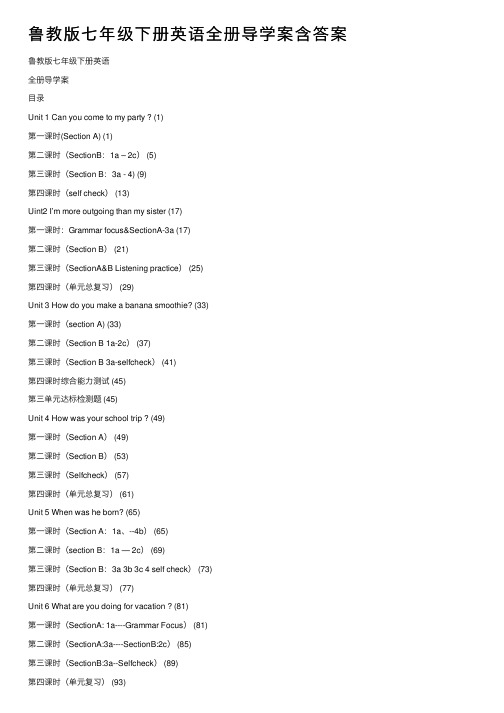
鲁教版七年级下册英语全册导学案含答案鲁教版七年级下册英语全册导学案⽬录Unit 1 Can you come to my party ? (1)第⼀课时(Section A) (1)第⼆课时(SectionB:1a – 2c) (5)第三课时(Section B:3a - 4) (9)第四课时(self check) (13)Uint2 I’m more outgoing than my sister (17)第⼀课时:Grammar focus&SectionA-3a (17)第⼆课时(Section B) (21)第三课时(SectionA&B Listening practice) (25)第四课时(单元总复习) (29)Unit 3 How do you make a banana smoothie? (33)第⼀课时(section A) (33)第⼆课时(Section B 1a-2c) (37)第三课时(Section B 3a-selfcheck) (41)第四课时综合能⼒测试 (45)第三单元达标检测题 (45)Unit 4 How was your school trip ? (49)第⼀课时(Section A) (49)第⼆课时(Section B) (53)第三课时(Selfcheck) (57)第四课时(单元总复习) (61)Unit 5 When was he born? (65)第⼀课时(Section A:1a、--4b) (65)第⼆课时(section B:1a — 2c) (69)第三课时(Section B:3a 3b 3c 4 self check) (73)第四课时(单元总复习) (77)Unit 6 What are you doing for vacation ? (81)第⼀课时(SectionA: 1a----Grammar Focus) (81)第⼆课时(SectionA:3a----SectionB:2c) (85)第三课时(SectionB:3a--Selfcheck) (89)第四课时(单元复习) (93)Unit 7 I’ m going to be a basketball player. (97)第⼀课时(1a----Grammar Focus) (97)第⼆课时Section A3a- SectionB 2c) (101)第三课时(SetionB3a—self-check) (105)第四课时(检测你雄厚的综合实⼒吧!) (109)Unit8 Could you please clean your room? (113)第⼀课时Section A (1a----Grammar Focus) (113)第⼆课时(3a----2c) (117)第三课时(3a-self-check) (121)第四课时 (125)Unit 9 What’s the best radio station? (129)第⼀课时(section A 1a-2c) (129)第⼆课时(section A 3a - self check) (133)第三课时(单元复习) (137)Unit 10 It’s a nice day ,isn’t it ? (141)第⼀课时(Section A:1a---4) (141)第⼆课时(Section B:1a--- 4) (145)第三课时单元复习 (149)Unit 1 答案 (153)unit2参考答案 (155)Unit3 参考答案 (157)单元达标检测题 (158)Unit 4 参考答案 (160)Unit 5参考答案 (163)unit6 答案 (165)unit7 参考答案 (166)Unit 8参考答案 (167)Unit 9 参考答案 (171)Unit10参考答案 (172)Unit 1 Can you come to my party ?亲爱的同学们,你曾参加或举⾏过聚会吗? 欢迎你⾛进Unit 1 , 相信你会成为风度翩翩的绅⼠或举⽌⽂雅得体的⼥⼠的!第⼀课时 (Section A)当你被别⼈邀请时,你都会做到恰如其分、彬彬有礼吗?相信你没问题!学法导引:学会情态动词can 的⼀般疑问句式及其肯定回答和否定回答。
(人教版)七年级下册英语导学案:Unit 3 How do you get to school
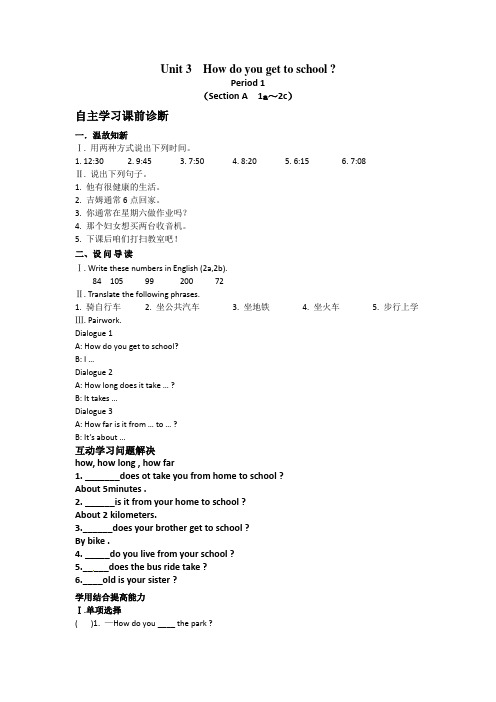
Unit 3 How do you get to school ?Period 1(Section A 1a~2c)自主学习课前诊断一.温故知新Ⅰ. 用两种方式说出下列时间。
1. 12:302. 9:453. 7:504. 8:205. 6:156. 7:08Ⅱ. 说出下列句子。
1. 他有很健康的生活。
2. 吉姆通常6点回家。
3. 你通常在星期六做作业吗?4. 那个妇女想买两台收音机。
5. 下课后咱们打扫教室吧!二、设问导读Ⅰ. Write these numbers in English (2a,2b).84 105 99 200 72Ⅱ. Translate the following phrases.1. 骑自行车2. 坐公共汽车3. 坐地铁4. 坐火车5. 步行上学Ⅲ. Pairwork.Dialogue 1A: How do you get to school?B: I …Dialogue 2A: How long does it take … ?B: It takes …Dialogue 3A: How far is it from … to … ?B: It’s about …互动学习问题解决how, how long , how far1. _______does ot take you from home to school ?About 5minutes .2. ______is it from your home to school ?About 2 kilometers.3.______does your brother get to school ?By bike .4. _____do you live from your school ?5._____does the bus ride take ?6.____old is your sister ?学用结合提高能力Ⅰ.单项选择( )1. —How do you ____ the park ?—I ____ a bus.A. get; byB. get to; takeC. get; take( ) 2. —Does your father go to work _________bus?—No, he ________his bike .A. by; byB. take; ridesC. by; rides( ) 3. —_______is it from your home to school?—It’s about 2 kilometers.A. HowB. How longC. How far( ) 4.—I walk to school.___________?—I walk to school, too.A. How about youB. How do you doC. How think ( ) 5. How long does it _______ you to go home?A. takeB. needC. getⅡ. 用英语单词完成下列算式1. 40+30=70 _____+_____=_____2. 12+26=38 _____+_____=_____3. 50+60=110 _____+_____=_____4. 18-6=12 _____-_____=_____5. 20+36=56 _____+_____=_____Ⅲ. 按要求完成句子,每空一词1.My father goes to work by bike.(对划线部分提问)your father to work?2.Mary goes to school by subway.(改为同义句)Mary the subway school.3.He often watches TV for two hours in the evening.(对划线部分提问)does he often watch TV in the evening?4.His dictionary is 50 dollars.(对划线部分提问)is his dictionary?5.This is her bike. (改为同义句)This bike is .课堂小节,形成网络填入适当的句子补全对话A: Hello, Bill.B: Hello, Mike.A: 1._____________?B:I get up at six.A: 2._____________?B: I have some bread for breakfast.A: 3._____________?B: No, I don’t like salad.A: 4._____________?B:I go to school by bus.A: And last question. 5._____________?B: My favourite subject is English.A: Thank you.B: You’re welcome.Unit3 How do you get to school ?Period 2(Section A 2e~3c)自主学习课前诊断一、温故知新Useful phrases:1.到校______________2.上班____________3. 到家_________________4. 到这儿________________________5. 到那儿______________6.去上学______________________________7.去上班____________________ 8.回家___________________9.去那儿______________________10. .乘地铁________________11.乘公共汽车______________12.乘火车_________________13. 乘飞机___________14.乘出租车________________________15.乘船________________16.骑自行车_________________17.步行_____________ 18.开车送他上学______________19.多远________________20.多久________________二、设问导读Ⅰ. Read 2e (P14) and complete the conversation.A: Hey, Jane. Is this your new bike?B: Yes. I ride it to school everyday. 1. ____________________A: I usually take the bus.B: 2. ____________________A: I’m not sure —about 10 kilometers? The bus ride takes about 20 minutes. 3. _________B: About 15 minutes by bike. It’s good exercises.A: Yeah, well, have a good day at school.B: You, too.Ⅱ. Read Grammar focus (P15). Then finish 3a and 3b (P15) with your partner.三、自学检测Ⅰ. Pairwork: Practice 2e (P14) with your partner and make your own conversation. Then act it out.Ⅱ. 单项选择( ) 1.—Is this bike________?—No, it’s not ________.A. your; mineB. yours; mineC. your; my( ) 2. —When do they get _______ Beijing?—They get ________ there at 8:00.A. to; toB. / ; /C. to; /( ) 3. The _________takes about _________ hour.A. bus ride; anB. bus ride; aC. ride bus; an( ) 4. Going to school by bike is _________.A. a good exercise.B. good exercises.C. good exercise.( ) 5.—Does she take the bus to school?—_________.She goes by bike.A. Yes, she doesB. No, she doesn’tC. I’m not sure互动学习问题解决用take 填空。
英语7译林牛津版unit3:导学案(语法和project)
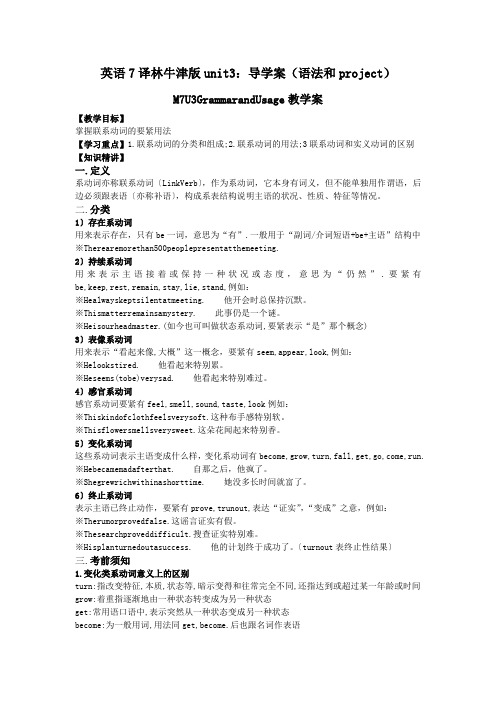
英语7译林牛津版unit3:导学案(语法和project)M7U3GrammarandUsage教学案【教学目标】掌握联系动词的要紧用法【学习重点】1.联系动词的分类和组成;2.联系动词的用法;3联系动词和实义动词的区别【知识精讲】一.定义系动词亦称联系动词〔LinkVerb〕,作为系动词,它本身有词义,但不能单独用作谓语,后边必须跟表语〔亦称补语〕,构成系表结构说明主语的状况、性质、特征等情况。
二.分类1〕存在系动词用来表示存在,只有be一词,意思为“有”.一般用于“副词/介词短语+be+主语”结构中※Therearemorethan500peoplepresentatthemeeting.2〕持续系动词用来表示主语接着或保持一种状况或态度,意思为“仍然”.要紧有be,keep,rest,remain,stay,lie,stand,例如:※Healwayskeptsilentatmeeting. 他开会时总保持沉默。
※Thismatterremainsamystery. 此事仍是一个谜。
※Heisourheadmaster.(如今也可叫做状态系动词,要紧表示“是”那个概念)3〕表像系动词用来表示“看起来像,大概”这一概念,要紧有seem,appear,look,例如:※Helookstired. 他看起来特别累。
※Heseems(tobe)verysad. 他看起来特别难过。
4〕感官系动词感官系动词要紧有feel,smell,sound,taste,look例如:※Thiskindofclothfeelsverysoft.这种布手感特别软。
※Thisflowersmellsverysweet.这朵花闻起来特别香。
5〕变化系动词这些系动词表示主语变成什么样,变化系动词有become,grow,turn,fall,get,go,come,run. ※Hebecamemadafterthat. 自那之后,他疯了。
七年级英语导学案(第三单元).2
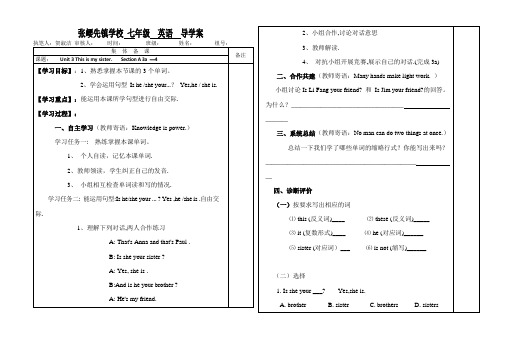
【学习过程】:
一、自主学习(教师寄语:Knowledge is power.)
学习任务一: 熟练掌握本课单词。
1、 个人自读,记忆本课单词.
2、教师读,学生纠正自己的发音.
3、 小组相互检查单词读和写的情况.
学习任务二: 能运用句型:Is he/she your ... ? Yes ,he /she is .自由交际.
A. amB. isC. areD. it
3. Is Li Fang your friend ? Yes,___is .
A. hisB. herC. sheD. he
4—Is that your mother ?
—_________________
A. Yes, it's. B. No, it is. C. Yes, it is D. No ,it not.
4、 对抗小组开展竞赛,展示自己的对话.(完成3a)
二、合作共建(教师寄语:Many hands make light work. )
小组讨论Is Li Fang your friend? 和 Is Jim your friend?的回答。为什么?__________________________________________
三、系统总结(教师寄语:No man can do two things at once.)
总结一下我们学了哪些单词的缩略行式?你能写出来吗?_________________________________________________
四、诊断评价
(一)按要求写出相应的词
⑴ this (反义词)____ ⑵ these (反义词)_____
Unit 3 I’m more outgoing than my教案
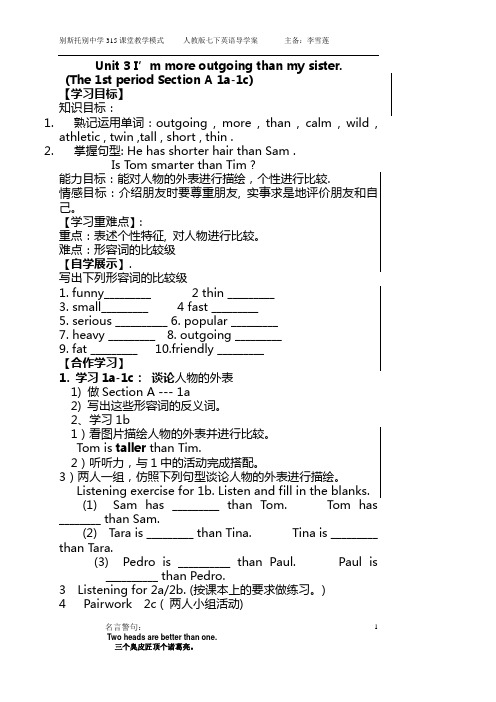
Unit 3 I’m more outgoing than my sister.(The 1st period Section A 1a-1c)【学习目标】知识目标:1.熟记运用单词:outgoing , more , than , calm , wild , athletic , twin ,tall , short , thin .2.掌握句型: He has shorter hair than Sam .Is Tom smarter than Tim ?能力目标:能对人物的外表进行描绘,个性进行比较.情感目标:介绍朋友时要尊重朋友, 实事求是地评价朋友和自己。
【学习重难点】:重点:表述个性特征, 对人物进行比较。
难点:形容词的比较级【自学展示】.写出下列形容词的比较级1. funny_________ 2 thin _________3. small_________ 4 fast _________5. serious __________6. popular _________7. heavy _________ 8. outgoing _________9. fat _________ 10.friendly _________【合作学习】1. 学习1a-1c:谈论人物的外表1) 做Section A --- 1a2) 写出这些形容词的反义词。
2、学习1b1)看图片描绘人物的外表并进行比较。
Tom is taller than Tim.2)听听力,与1中的活动完成搭配。
3)两人一组,仿照下列句型谈论人物的外表进行描绘。
Listening exercise for 1b. Listen and fill in the blanks.(1) Sam has _________ than Tom. Tom has ________ than Sam.(2) T ara is _________ than Tina. Tina is _________ than T ara.(3) Pedro is __________ than Paul. Paul is__________ than Pedro.3 Listening for 2a/2b. (按课本上的要求做练习。
七级英语下册UnitHowdoyougettoschool导学案(无答案)(新版)人教新目标版
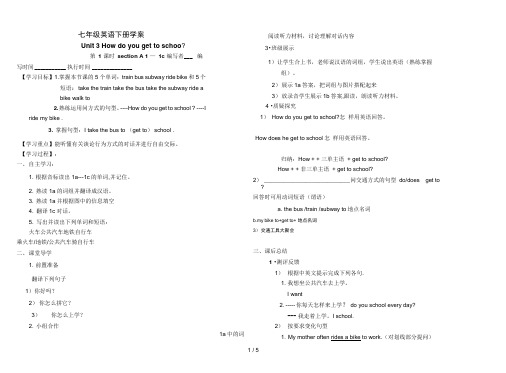
七年级英语下册学案Unit 3 How do you get to schoo?第 1 课时section A 1 —1c 编写者___ 编写时间___________ 执行时间______________【学习目标】1.掌握本节课的5个单词:train bus subway ride bike 和5 个短语:take the train take the bus take the subway ride abike walk to2. 熟练运用问方式的句型。
----How do you get to school ? ----Iride my bike .3. 掌握句型:I take the bus to (get to) school .【学习重点】能听懂有关谈论行为方式的对话并进行自由交际。
【学习过程】:一、自主学习:1. 根据音标读出1a---1c的单词,并记住。
2. 熟读1a的词组并翻译成汉语。
3. 熟读1a并根据图中的信息填空4. 翻译1c对话。
5. 写出并读出下列单词和短语:火车公共汽车地铁自行车乘火车/地铁/公共汽车骑自行车二、课堂导学1. 前置准备翻译下列句子1)你好吗?2)你怎么拼它?3)你怎么上学?2. 小组合作阅读听力材料,讨论理解对话内容3•班级展示1)让学生合上书,老师说汉语的词组,学生说出英语(熟练掌握组)。
2)展示1a答案,把词组与图片搭配起来3)放录音学生展示1b答案,跟读,朗读听力材料。
4 •质疑探究1)How do you get to school?怎样用英语回答。
How does he get to school怎样用英语回答。
归纳:How + + 三单主语+ get to school?How + + 非三单主语+ get to school?2) ___________________________ 问交通方式的句型do/does get to ?回答时可用动词短语(谓语)a. the bus /train /subway to地点名词b.my bike to+get to+ 地点名词3)交通工具大聚会三、课后总结1 •测评反馈1)根据中英文提示完成下列各句.1. 我想坐公共汽车去上学。
七年级英语导学案

【展示课导学】(时段:2课时)备课人:七年级英语组(一)学习内容:Unit3 Topic1 Does he speak Chinese ? Section A 听说课(二)学习目标:1.我能听说下列重点单词could , tell, sure, some, with ,problem, well, often.2.我要学会礼貌询问他人姓名和表达请求。
(三)重点:礼貌询问,表达请求,寻求帮助。
难点:实义动词“like”,“want”,“speak”的一般现在时第一人称、第二人称的用法以及人称代词主格和宾格的用法Self-study & Self-exploration Cooperation&Exploration Show&Improvement Conclusion& Summarization自学指导内容·学法展前充电展示方案内容·形式′随堂笔记成果记录·知识生成·同步演练本课学习策略:注意倾听主动开口Step1:导学1复习外貌导入,教师自然导入句型-Could you please do sth. ?-Sure , …/ Of couse , … / No problem ...2 Practice the key sentences:Could you tell me your name?Could you help me with it?Do you like Chinese?I want to find a pen pal.Step2:独学听录音1.学科代表带大家读新单词两遍2看图片猜测对话内容,快速浏览1b, .播放1a课文录音a)听1a两遍,完成1b,小组检测核对答案第三遍:跟读,模仿语音语调Step3: 互学. 群学.预展1小组起立,小组长教读1a对话,对于不理解和不会读的句子,小组讨论学习。
有争议时可向老师寻求帮助.小组就抽取到的展示任务积极讨论,充分做好展示准备工作。
七年级英语下册 Unit 3 How do you get to school知识点总结+导学案(无答案)(新版)人教新目标版
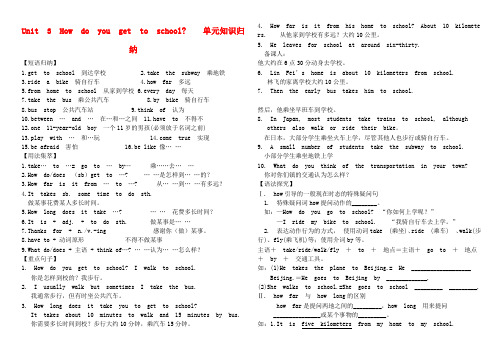
Unit 3 How do you get to school? 单元知识归纳【短语归纳】1.get to school 到达学校2.take the subway 乘地铁3.ride a bike 骑自行车4.how far 多远5.from home to school 从家到学校6.every day 每天7.take the bus 乘公共汽车 8.by bike 骑自行车8.bus stop 公共汽车站 9.think of 认为10.between …and …在…和…之间11.have to 不得不12.one 11-year-old boy 一个11岁的男孩(必须放于名词之前)13.play with …和…玩 e true 实现15.be afraid 害怕 16.be like 像……【用法集萃】1.take…to …= go to …by…乘……去……2.How do/does (sb)get to …? ……是怎样到……的?3.How far is it from …to …? 从……到……有多远?4.It takes sb. some time to do sth.做某事花费某人多长时间。
5.How long does it take …? ……花费多长时间?6.It is + adj. + to do sth. 做某事是……7.Thanks for + n./v.-ing 感谢你(做)某事。
8.have to + 动词原形不得不做某事9.What do/does + 主语 + think of…? ……认为……怎么样?【重点句子】1. How do you get to school? I walk to school.你是怎样到校的?我步行。
2. I usually walk but sometimes I take the bus.我通常步行,但有时坐公共汽车。
3. How long does it take you to get to school?It takes about 10 minutes to walk and 15 minutes by bus. 4. How far is it from his home to school? About 10 kilomete rs. 从他家到学校有多远?大约10公里。
Unit 3导学案2021--2022学年人教版七年级英语下册

Unit 3 How do you get to school?( Period 1 Section A 1a—2d )【学习目标】A级目标(词汇):train, bus, subway, ride, bike...B级目标(短语):take the train, take the bus, take the subway, ride a bike..C级目标(句型):谈论如何到达某地【自学指导】A任务:1.请同学们尽可能多的说出表示交通工具的词汇2.自主完成1a,将单词与图片匹配B任务:小小翻译官1.到校________________2.坐火车___________________3.坐公汽_______________4.乘地铁___________________5.骑单车________________6.步行_____________________C任务:和你的同桌练习下面的对话,斜体部分可以互换eg. ---How do you get to school? ---I ride my bike / take the bus … to school.【当堂检测】A检测:根据中文写单词或者短语1.火车________2.公共汽车________3.地铁_____________4.乘地铁_________ ___________5.骑________6.自行车________ ________7.骑自行车(动作)________________8.六十________9.七十________10. 一百________ ______11.分钟_____________12.千米,公里________________ 13.新的_______ 14.乘(交通工具)____________ 15.骑自行车(方式)_______________ B检测:试翻译词组,熟读并记住它们的意思1. take the train ___________2. take the subway___________3. ride a horse _________4. by train ___________5. by subway _______________6. by horse _____________ C检测:小小翻译官1.你怎样到达学校?骑自行车?2.去学校要花多少时间?大约40分钟。
牛津译林版七年级英语下册《Unit 3》导学案1

专注:心无旁骛,万事可破《Unit 3》导学案目标导航1、掌握以下单词和词组:mine nothing tin pizza onlywa it a minute 稍等exchange student 交换生take to...带某人去...2、通过卡通漫画中Eddie 和Hob o之间的有趣的对话,了解本单元的学习重点。
课堂反馈练习一、根据句意和中文提示完成句子1.how many (听) of dog food are there in Eddie’s fridge?2. (没有) of the answers are right.3. (欢迎) to our town for a trip.4.my favourite sport is (足球).5.we can buy (只有) one pizza (用) the (钱).6.I can’t find my Walkman. (也许) it’s in my brother’s bedroom.7.There isn’t enough fo od in the fridge .Let’s go to the (大型购物中心) to buy some.8.What dishe s do you want to (点).二、用所给词的正确形式填空。
1.Jim is a movie fan.He (love) (watch) films.2.Simon enjoys (play) tennis.3.He likes (eat) .He often goes to lots of different Ch ine se (restaurant).4.She often takes her daughter (climb) hills in winter.5.Would you like (go) to the sports center with me?1 / 1。
最新人教新目标七下Unit3 How do you get to school 导学案
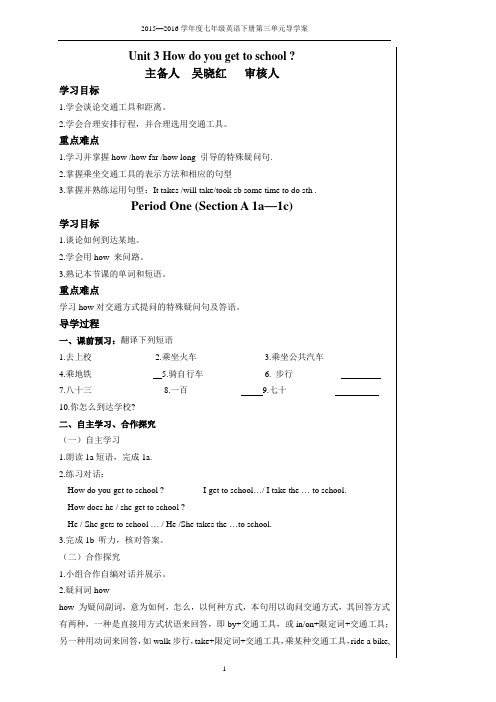
Unit 3 How do you get to school ?主备人吴晓红审核人学习目标1.学会谈论交通工具和距离。
2.学会合理安排行程,并合理选用交通工具。
重点难点1.学习并掌握how /how far /how long 引导的特殊疑问句.2.掌握乘坐交通工具的表示方法和相应的句型3.掌握并熟练运用句型:It takes /will take/took sb some time to do sth .Period One (Section A 1a—1c)学习目标1.谈论如何到达某地。
2.学会用how 来问路。
3.熟记本节课的单词和短语。
重点难点学习how对交通方式提问的特殊疑问句及答语。
导学过程一、课前预习:翻译下列短语二、自主学习、合作探究(一)自主学习1.朗读1a短语,完成1a.2.练习对话:---How do you get to school ? ---I get to school…/ I take the … to school.---How does he / she get to school ?---He / She gets to school … / He /She takes the …to school.3.完成1b 听力,核对答案。
(二)合作探究1.小组合作自编对话并展示。
2.疑问词howhow 为疑问副词,意为如何,怎么,以何种方式,本句用以询问交通方式,其回答方式有两种,一种是直接用方式状语来回答,即by+交通工具,或in/on+限定词+交通工具;另一种用动词来回答,如walk步行,take+限定词+交通工具,乘某种交通工具,ride a bike,骑自行车,drive a car开车等。
除此之外,how还用以询问程度或方法等。
3.take the +交通工具用来表示“乘……”相当于by +交通工具如:I usually take the bus to work. = I usually go to work _____ _____.take the train to school = go to school ____ _____walk to school= go to school ____ _____三、达标检测:(一)选择题( ) 1. -----How does your sister get to school? ----_______A. Once a dayB. Two milesC. Take a busD. Twenty minutes ( ) 2. My sister_________the bus to school everyday.A. onB. byC. takesD. ride( ) 3. ------_________ ----- By bus.A. Why does he go to work?B. How does he go to work?C. When does she go to work?( ) 4. I usually go to school ___ bike, but sometimes I go to school ___foot.A. with, onB. on, byC. by, on( ) 5. Do you usually go to school ____bus or _____foot? I walk to school.A. by, onB. by , byC. on, by(二)句型转换1.He takes a bus to school .(同义句)He gets to school ________ _________ .2.I get to work by boat . (划线部分提问)_______ ________you get to work ?3. They go to Changsha by train. (改为同义句)They _________ __________ _________ to Changsha.4.Linda sometimes takes the subway to school. (改为一般疑问句)_________ Linda sometimes ________the subway to school?课后反思Period Two (Section A 2a—2e)学习目标学习谈论怎么到达一些地方及花费时间和距离。
牛津译林版七年级英语下册《Unit 3》导学案7
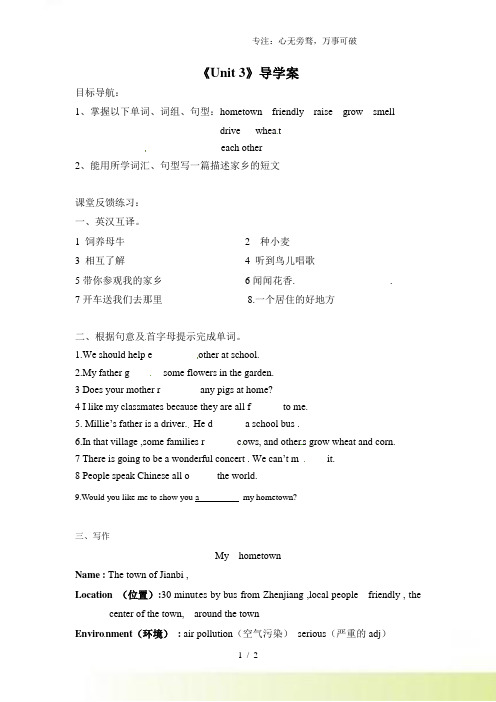
《Unit 3》导学案目标导航:1、掌握以下单词、词组、句型:hometown friendly raise grow smelldrive whea teach other2、能用所学词汇、句型写一篇描述家乡的短文课堂反馈练习:一、英汉互译。
1 饲养母牛________________2 种小麦____________________3 相互了解_________________4 听到鸟儿唱歌___________________5带你参观我的家乡________________ 6闻闻花香.___________________.7开车送我们去那里______________ 8.一个居住的好地方______________二、根据句意及首字母提示完成单词。
1.We should help e_______ other at school.2.My father g______ some flowers in the garden.3 Does your mother r______ any pigs at home?4 I like my classmates because they are all f______ to me.5. Millie’s father is a driver.He d______ a school bus .6.In that village ,some families r______ c ows, and others grow wheat and corn.7 There is going to be a wonderful concert . We can’t m_____ it.8 People speak Chinese all o_____ the world.9.Would you like me to show you a my hometown?三、写作My hometownName : The town of Jianbi ,Location (位置):30 minutes by bus from Zhenjiang ,local people friendly , the center of the town, around the townEnviro nment(环境): air pollution(空气污染)serious(严重的adj)green trees ,a quiet place.Things to do :go boating on the lake, climb green hills ,enjoy local f ood, hear the birds sing, smell the flowerw,要求: 1.可以用上面的词,使内容连贯;2.80词左右。
七年级英语下册导学案:Unit 3 How do you get to school 4

预习范围:Page 17- Page 18预习目标:①能够默写基础词汇和短语;②能够正确翻译长难句子;预习内容:1.T ranslate the following phrases into Chinese.have to walk to your last e-mail the bus ride2.T ranslate the following sentences into Chinese.1.Y ou want to know how I go to school.2.M y school is about 20 kilometers from my home.3.T he bus ride is never boring because I always talk to my class mates.4.S o these students go on a ropeway to cross the river to school.5.D o you like your trip to school?3.Finish 3a and Self Check.探究目标:Period 4 Inquiry Plan(探究案)①能够运用新短语,如“be afraid of”、“no+名词”、“hav e t o”、“复合形容词”等,进行简单的造句;②复习巩固本单元所学;重难点分析:对比1:① I am afraid of tigers.② She is afraid of swimming in the river.③ His students are all afraid of him.④ He is afraid to speak English.思考:短语“be afraid of”中的be 动词随着的变化而变化,后面通常接、、动词的i ng 形式,译为。
而“be afraid to”后面通常接。
冀教版七年级英语下册Unit3 lesson 15 make a difference 导学案

Unit3 lesson 15 make a difference 导学案主备人:审核人:授课班级:1、2 姓名:备课组:学习内容Lesson15:make a difference 课型:New lesson 学习目标knowledge and skills(知识与技能)1. Master the new words :difference,village, education, yourself, drop, possible, never,future.2.understand the meaning of text.3.Learn to pra ise something or somebody!process and method(过程与方法)task-driven(任务驱动)→a sk me about(名师在线)→case by case(因材施教)emotional attitude and values(情感态度与价值观)T Know Chinese school, understand the ddifference between Chinese and Can ada.emphasis(重点)反身代词, possible , difference , never 及本课重点句型Difficulty(难点)反身代词时间分配导课 1 分、自学 6 分、交流 14 分、展示 10 分、小结 4 分、巩固 5 分学习过程学案(学习过程)导案(学法指导)【reading practice】(阅读训练)P39第2题【listening practice】(听力训练)P39第1题【Translation Solitaire】(翻译大接龙)Lesson15:make a difference【Self-study cooperation inquir y→AskMe about ,coach error correction】(自学、合作、探究→名师在线,辅导纠错)探究一: Last year, I wanted to give up my Lead in:(引入)Do you want to knowHao Tongxin?Let us realize him.Language points :1、Last year, I wanted togive up my studies.去年,studies.去年,我想退学。
人教版七年级英语下册Unit3全单元导学案

Unit 3 How do you get to school?Section A 1 (1a-2e)【学习目标】1. 学习各种交通工具的名称,以及表达“使用某种交通工具”的动词搭配。
2. 通过听说训练学会运用所学词汇和短语谈论出行方式。
3. 学习以how引导特殊疑问句来谈论如何出行、出行距离及所用时间的核心句型。
【重点和难点】重点:掌握与交通方式有关的核心词汇和使用某种交通工具的动词搭配。
难点:How引导的特殊疑问句中助动词的使用以及语序,How far,How long 引导的特殊疑问句的回答和运用。
【课前预习】I. 单词速记。
1. 火车2. 公共汽车____________________3. 地铁4. 骑;旅程____________________5. 六十6. 九十________________________7. 分钟8. kilometer_____________________9. new 10. far ______________________11. every __________________II. 短语互译。
1. 乘坐地铁___________2. 乘坐公共汽车__________________3. 骑自行车______________4. 多长(时间)_______________5. every day_________________6. take the train _____________7. how far _________________III. 句子翻译。
1. –你是怎样到学校的?--我骑自行车。
--How do you get to school?--I _________ __________ __________.2. 到学校花费你多长时间?_____ _____ does it _____ you _____ get to school?3. How far is it from your home to school?__________________________4. Have a good day at school.__________________________【合作探究】探究一、知识链接Transportation(交通工具):bike/ bicycle 自行车motorbike 摩托车car 小汽车bus 大客车jeep 吉普车truck 卡车tractor 拖拉机taxi 出租汽车boat 小船ship 轮船warship 军舰plane 飞机spaceship 宇宙飞船helicopter 直升飞机subway【美】/underground 【英】地铁train 火车LRT=Light Rail Transit 轻轨Metro 地铁Metro/Subway Station 地铁站Wuhan Subway/Metro line 2 武汉地铁二号线探究二、基础感知Task 1 学习表示“乘……”的表达方式,试着填一填。
外研版英语七年级下册Module 3 《What are you going to do at the weekends》导学案
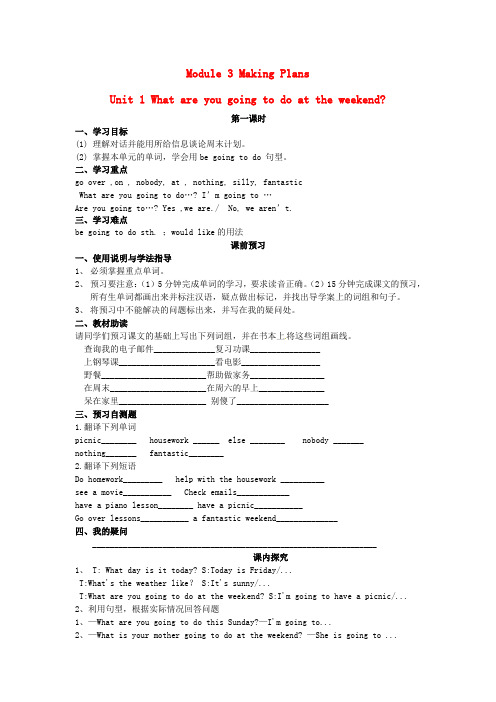
Module 3 Making PlansUnit 1 What are you going to do at the weekend?第一课时一、学习目标(1) 理解对话并能用所给信息谈论周末计划。
(2) 掌握本单元的单词,学会用be going to do 句型。
二、学习重点go over ,on , nobody, at , nothing, silly, fantasticWhat are you going to do…? I’m going to …Are you going to…? Yes ,we are./ No, we aren’t.三、学习难点be going to do sth. ;would like的用法课前预习一、使用说明与学法指导1、必须掌握重点单词。
2、预习要注意:(1)5分钟完成单词的学习,要求读音正确。
(2)15分钟完成课文的预习,所有生单词都画出来并标注汉语,疑点做出标记,并找出导学案上的词组和句子。
3、将预习中不能解决的问题标出来,并写在我的疑问处。
二、教材助读请同学们预习课文的基础上写出下列词组,并在书本上将这些词组画线。
查询我的电子邮件______________复习功课________________上钢琴课______________________看电影__________________野餐________________________帮助做家务_________________在周末______________________在周六的早上_______________呆在家里____________________ 别傻了_____________________三、预习自测题1.翻译下列单词picnic________ housework ______ else ________ nobody _______nothing_______ fantastic________2.翻译下列短语Do homework_________ help with the housework __________see a movie___________ Check emails____________have a piano lesson________ have a picnic___________Go over lessons___________ a fantastic weekend______________四、我的疑问_________________________________________________________________课内探究1、 T: What day is it today? S:Today is Friday/...T:What's the weather like? S:It's sunny/...T:What are you going to do at the week end? S:I'm going to have a picnic/... 2、利用句型,根据实际情况回答问题1、—What are you going to do this Sunday?—I'm going to...2、—What is your mother going to do at the weekend? —She is going to ...3、—what are your friends going to do at the weekend?—They are going to... 3、听录音掌握大意并完成Activity4.(一)1、听力练耳 Listen and match (听录音,连线组成短语,然后朗读这些短语,背诵) 2、Write the phrases in Activity1 and the picture.(Activity2)(二)对话处理读前听Listen to the dialogue, and answer the questions.1、Is Daming going to check his email?2、Is Betty going to a party at a friend’s home on Saturday evening?3、What is Daming going to do on Saturday afternoon?听后读:最大声、最准确的朗读对话一遍,说一说Betty和Daming的计划。
- 1、下载文档前请自行甄别文档内容的完整性,平台不提供额外的编辑、内容补充、找答案等附加服务。
- 2、"仅部分预览"的文档,不可在线预览部分如存在完整性等问题,可反馈申请退款(可完整预览的文档不适用该条件!)。
- 3、如文档侵犯您的权益,请联系客服反馈,我们会尽快为您处理(人工客服工作时间:9:00-18:30)。
课题Unit 3 How do you get to school?学习目标1、单词:train, bus, subway, ride, bike, sixty, seventy, eighty, ninety, hundred, far, minute, kilometer, new, every, every day2、句型:①—How do you get to school? —I ride my bike.②—How does Mary get to school? —She takes the subway.3、how引导的特殊疑问句,表示乘坐何种交通工具的方式。
how far, how long 引导的特殊疑问句。
重点1) how /how far /how long 引导的特殊疑问句.2) 乘坐交通工具的表示方法.3) It takes / sb. some time to do sth..难点—How do you get to school? —I take the …/ride …/ walk…—How does Mary get to school? —She takes the subway. —How long does it take? —It takes forty minutes. —How far is it from… to…—It's… kilometers.学习过程:第1课时Section A 1a—2d教师寄语:One cannot put back the clock. 时钟不能倒转。
【导学自习】1、预习课本P13的内容,标出不认识的单词,然后到P89生词表中去找到这些单词,在课本中标出音标和汉语意思,再读三遍。
2、小组互查预习作业。
【自主检测】:Ⅰ. 根据句意及所给汉语提示,写出句中所缺单词。
1. How much is this ________(自行车)?2. There are lots of people on the ________(公共汽车)3. Look! The ________(地铁) is coming.4. Is this the right ________(火车) to London?【研习展评】合作探究1. Check the preview homework in groups, then discuss them in class.2. Present the key structures.3. Pair work.Make a sample -- Group work -- Show time.4. Group work.Make a sample -- Group work -- Show time.5. Listening (1b, 2a, 2b)a. Listen and complete.b. Read aloud the listening material.c. Role play the listening material.6. Pair work and then show.【当堂检测】I根据汉语意思完成英语句子或对话,每空一词。
1. 你经常坐火车去天津吗?Do you usually ________ ________ ________ to Tianjin?2. 我步行去学校。
你呢?I ________ to school. ________ ________ you?3. 你会骑自行车吗?Can you ________ a(n) ________?4. ——埃米通常怎么去动物园?——她乘地铁。
—________ ________ Amy usually go to the zoo?—She ________ ________ ________.抄写并熟记本课单词。
作业总结反思第2课时Section A 2a—2d教师寄语:A good beginning makes a good ending.【导学自习】1、读记本课单词。
2、读Grammar Focus 的句子,并翻译在书上。
自主检测:用英语写出下列数字:研习展评】合作探究1. Check the preview homework, and the exercises.2. Practice in pairs,3. Listening and complete 2a and 2b. Check the answers with the whole class.4. Listen and repeat after the tape, then practice in pairs and act.5. Role play 2d.【当堂检测】根据括号内的要求完成下列各题,每空一词。
1. My mother walks to the station. (改为一般疑问句)_______ your mother _______ to the station?2. David usually goes to his uncle’s home by bike. (对划线部分提问) _______ _______ David usually go to his uncle’s home?3. It’s 3 kilometers from my home to the store. (对划线部分提问)_______ _______ is it from your home to the store?4. Tom needs two hours to make a model plane. (对划线部分提问) _______ _______ does Tom need to make a model plane?5. We need about a quarter to get to school. (改为同义句)_______ _______ us about a quarter _______ _______ to school.6. Her cousin often takes the bus to the park. (改为同义句) Her cousin often goes to the park _______ _______.总结反思第3课时Section A Grammar Focus—3c教师寄语:Knowledge is power。
(知识就是力量)【导学自习】1、朗读背诵默写Grammar Focus。
2、完成3a和3b。
自主检测:根据句子或对话意思及所给首字母提示,补全句中所缺单词。
1. The basketball is old. I’ll buy a n one.2. Half an hour is thirty m .3. —Where does your aunt l , Helen?—In London.4. Joe has a car, but he can’t d .5. The library isn’t f . You can walk there.【研习展评】合作探究1. Check the preview homework and the answers.2. See who can recite Grammar Focus.3. Read aloud Grammar Focus in groups and then see whichgroups read the best.4. Go over 3a and 3b with the class. Give necessary explanations. 【当堂检测】根据对话内容,从方框中选择恰当的选项补全对话。
A: Hey, Linda. (1)__________B: Yes. I drive to work every day.A: (2)__________B: About 15 minutes.A: (3)__________B: What about you? (4)__________A: I ride my bike.B: Riding a bike is good for health. (5)__________ A: About 3 kilometers.A. How far is it from your home to your work place?B. How do you go to work?C. Is this your car?D. Oh, that’s quick!E. How long does it take?作业读记单词和短语。
背诵Grammar Focus.总结反思第4课时Section B 1a—1e教师寄语:No pains, no gains. 不劳无获。
【导学自习】1. 读记本课单词。
自主检测:根据句意及所给汉语提示,写出句中所缺短语。
1. There is a(n) ___________(公共汽车站) near my home.2. Let’s meet at 8:00 a.m. at the ___________(火车站).3. What do you ___________(认为) this trip?4. Molly is at the ___________(地铁站) now.【研习展评】合作探究1. Check the preview homework.2. Read aloud the new words in 1a.3. Listen and complete 1c and 1d.4. Pairwork: Role-play the listening material and then act out before the class.1.【当堂检测】根据所给图片完成英语对话,每空词数不限。
—_____________ Alice get to the park?—She first _____________. Then she _____________.—_____________ they go to their grandparents’ home?—They first _____________ and then _____________.作业 1.熟记单词。
2,完成练习册上作业。
总结反思第5课时( Section B 2a---Self check)教师寄语:No pains, no gains. 不劳无获。
